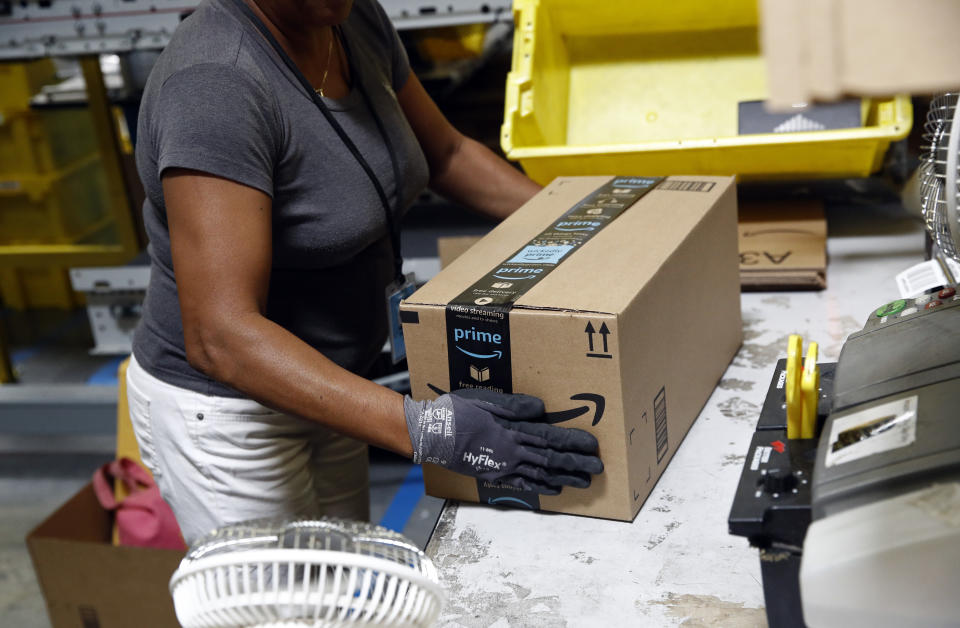Amazon hires thousands of warehouse workers a month ahead of Prime Day
You know Prime Day has become a major phenomenon when Amazon (AMZN) finds it doesn’t have enough people handling the orders.
In anticipation of a large volume of orders flooding in during Prime Day, Amazon’s annual sales event in July, the e-commerce giant went on a hiring spree for its warehouse networks across the country, weeks before the July 15-16 event. In June alone, Amazon hired 5,000 full-time warehouse associates to help with Prime Day as well as back-to-school sales in the summer, the retailer told Yahoo Finance.
The exclusive hiring figure provided to Yahoo Finance offers a glimpse into the scale of the self-made shopping event Amazon created in 2015. Retailers usually hire seasonal workers for the traditional shopping holidays like Black Friday and Christmas, but adding headcount for a summer sale event is less common.
Amazon acknowledged the hiring in June is higher than normal, but didn’t provide specifics. According to web-sourced alternative data provider Thinknum, job posts for Amazon warehouse workers in June tripled from January.

The heightened hiring activity highlights the ordering boom during the sale event and the mounting pressure on the retailer to fulfill its promise of faster Prime delivery. Amazon has invested $800 million in the second quarter to speed up the transition to one-day delivery for Prime members. It’s worth noting that Prime delivery now only guarantees that the item will arrive within two days after it ships, not two days after it's ordered.
To cut the time that consumers need to wait from the moment they click “order”, Amazon is building out both shipping and fulfillment capacity. The longest-ever Prime Day this year is likely to be a good stress test before the shopping holidays.
Busier than Black Friday
While Prime Day means two days of deal hunting for Prime members, for associates working in warehouses, it means long work hours and lots of overtime due to the large volume of orders coming in.
Even with thousands of additional helping hands, it’s not easy. Associates who work in in-bound roles get busy checking and storing inventories weeks ahead of Prime Day. To them, having to work for about 55-hour weeks is very common. In 2017, when the heavily hyped shopping event ran for 30 hours, Prime Day for the first time generated more sales than Black Friday or Cyber Monday for Amazon.

Amazon associates call the time from Thanksgiving to Christmas the peak, but now Prime Day is more intense. Some feel the workload is too heavy, while others are happy they can make extra money working longer hours. Last year, Amazon raised the hourly minimum wage to $15 but took away monthly bonuses and stock options.
“The packing department has seen five new hires every other week, but [still] understaffed,” an Amazon associate in Wisconsin told Yahoo Finance.
For the second largest private employer in the U.S., the hiring spree will continue. Amazon eyes adding 15,000 more full-time associate roles by the end of this summer. It also plans to open eight Amazon Robotics fulfillment centers by the end of 2019.
This article was originally published on July 11.
Krystal Hu covers technology and China for Yahoo Finance. Follow her on Twitter.
More Prime Day coverage:
Read more:
New bipartisan bills threaten Chinese IPOs and Chinese companies listed in the U.S.
This court ruling could change who’s responsible for your Amazon purchases
Read the latest financial and business news from Yahoo Finance
Follow Yahoo Finance on Twitter, Facebook, Instagram, Flipboard, SmartNews, LinkedIn, YouTube, and reddit.
